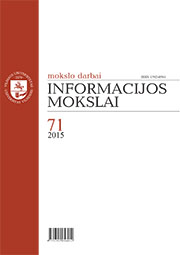Žinių valdymo metodologija: dialektinis požiūris į žinių plėtojimo procesą
The methodology of knowledge management: dialectical approach to the knowledge management process
Author(s): Virginijus TAMAŠEVIČIUSSubject(s): Education, Methodology and research technology, Management and complex organizations, Socio-Economic Research
Published by: Vilniaus Universiteto Leidykla
Keywords: organizational learning; knowledge development; dialectics; SWOT analysis;
Summary/Abstract: The aim of this paper is to apply the dialectical methodological approach to the analysis of knowledge development within the organizations. Three different methodological approaches can be found when analyzing knowledge development: linear approach, learning cycles or learning loops approach, and dialectical. The first one is rarely used as the main approach to analyze knowledge itself. Usually its assumptions can be found in the analysis where knowledge development is seen only as side-effect of another issue, like students’ knowledge evaluation in the learning process. Knowledge cycle’s concept developed by Argyris and elaborated by many other authors includes zero, single, double and triple loops learning concepts. The major issue with those concepts is the lack of explanation what can provide the driving force to a move knowledge development from simpler learning to a more sophisticated learning cycle.This internal driver for learning development is provided by applying dialectical approach. The internal tension created by opposite mindset should led from thesis to antithesis and then to creating a new thesis. This approach can be illustrated by moving conceptual understanding of strategy development from the SWOT analysis to recourse-based view and then to knowledge-based view. Understanding of the SWOT logic for formulation of strategy not only helps better understanding how this analysis should be carried out (thesis development), but also leads to understanding of all deficiencies of that approach (building anti-thesis), what drives to conceptualization of a new view, which could be called resource-based view.Such approach can be used for the analysis of knowledge development within the organizations as well. The interpretation of Bloom’s taxonomy of learning domains can be used to describe theses at the organizational level. Every organizational thesis on a particular issue includes cognitive (intellectual, informational), motivational (emotional, values) and technological (structures, processes) dimensions. As a case analysis of three furniture manufacturing companies shows, different companies apply different theses to deal with the same issue – to design and to supply a specific set of furniture for the customer. The major conclusion from the analysis is that knowledge development can be seen as a step-wise process moving knowledge hierarchically from the lower level to a higher level by solving tension issues within the former thesis.
Journal: Informacijos mokslai
- Issue Year: 2015
- Issue No: 71
- Page Range: 97-114
- Page Count: 18
- Language: Lithuanian

